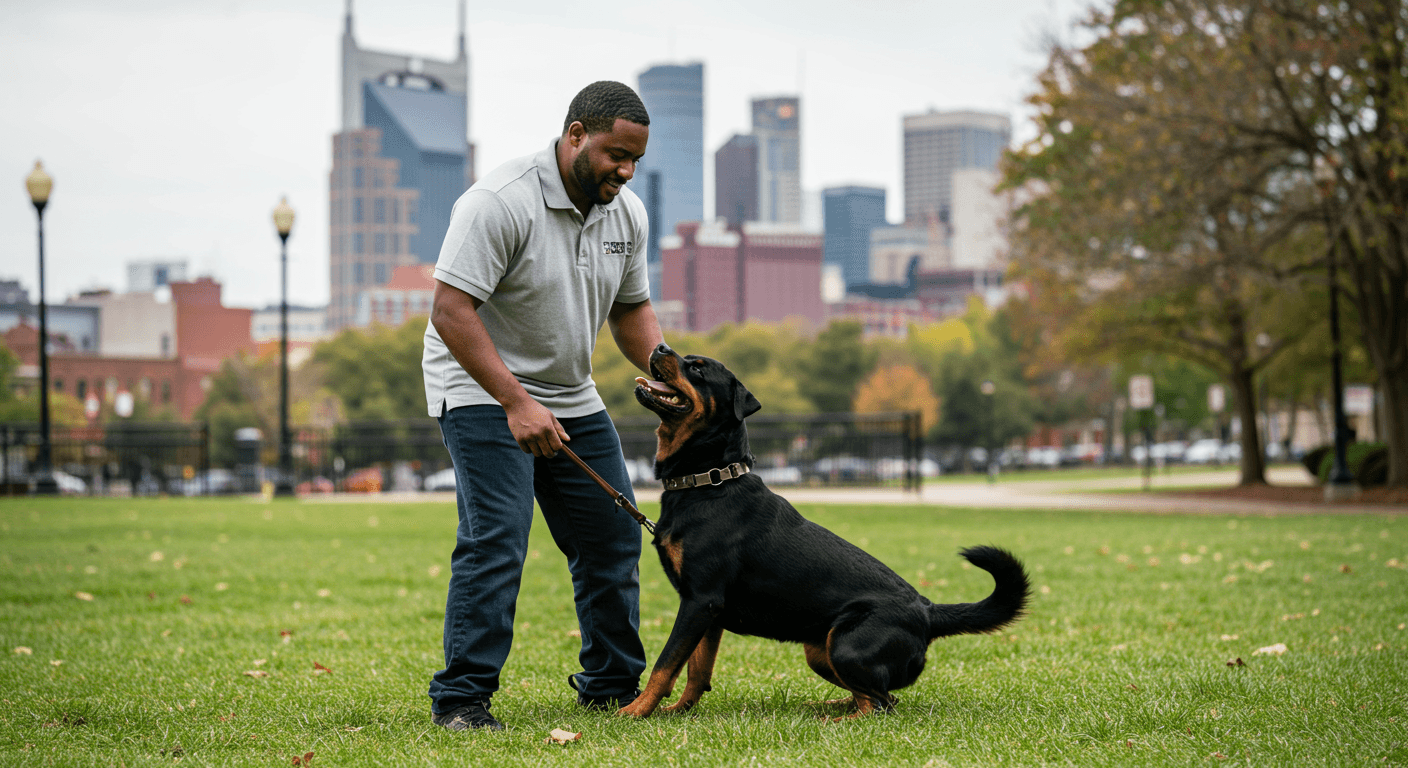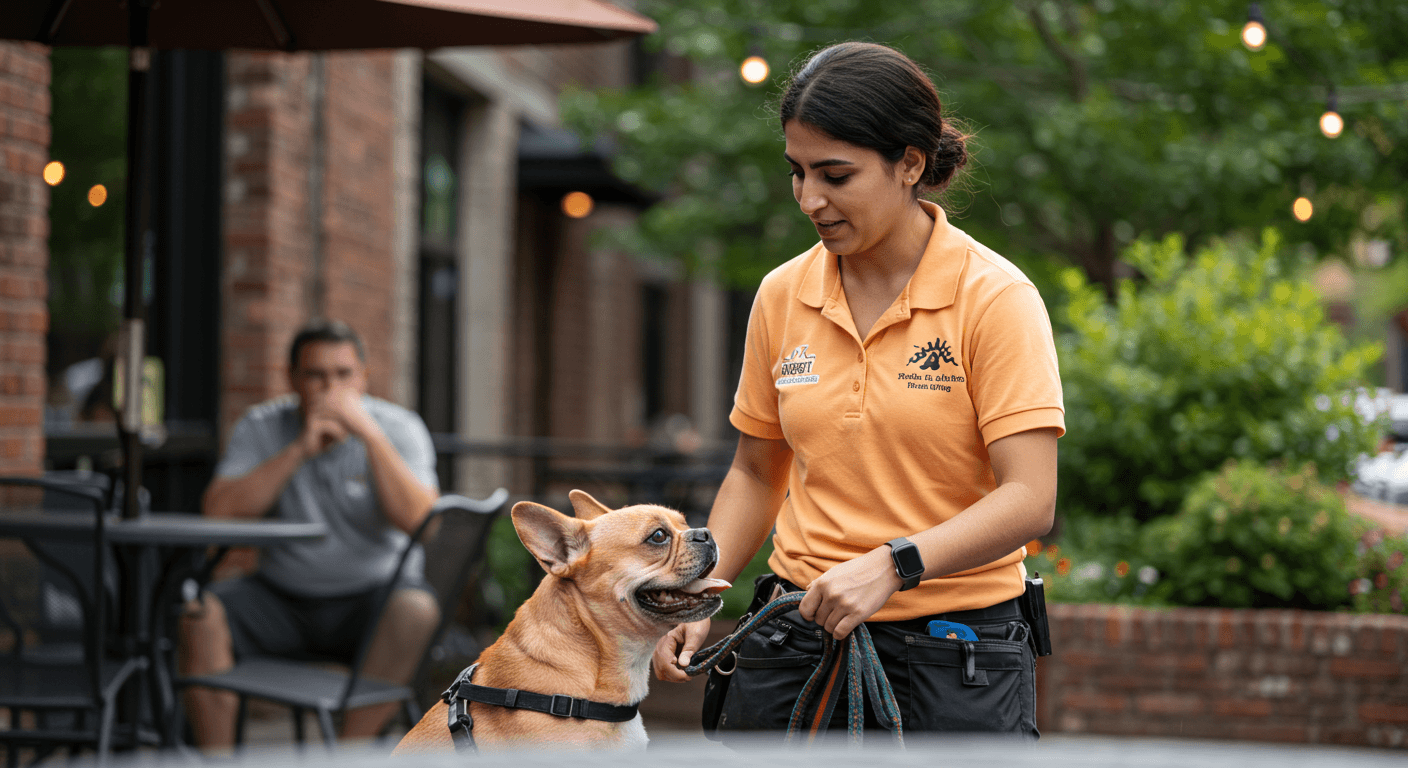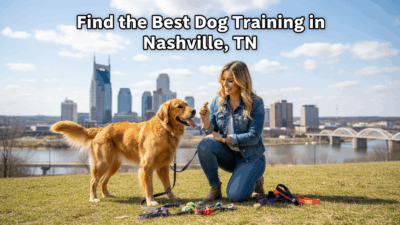Your Complete Guide to Choosing a Dog Trainer in Nashville TN
Living with a dog in Nashville means navigating busy streets in Germantown, enjoying the buzz around East Nashville parks, and maybe catching live music patios in The Gulch or 12 South. Your dog needs to handle honky-tonk crowds on Lower Broadway, stay calm when pedestrians gather for First Saturday Art Crawls, and walk politely past outdoor dining tables without begging.
Since Nashville sits in Davidson County, most local rules follow Metro codes and Tennessee state law. When you find a trainer who understands these Music City details, you’ll get better results both at home and out in your community.
How to Choose the Right Trainer
Start by looking for someone who uses positive reinforcement training and can set realistic goals for your Nashville lifestyle. This means your dog should learn to walk calmly through Shelby Bottoms Greenway, stay focused near Bicentennial Capitol Mall crowds, and handle vet visits without drama.
Credentials give you a quick way to compare trainers’ experience levels. Common dog trainer certifications include KPA-CTP, CPDT-KA, or IAABC-CDBC for behavior problems. If your dog has serious aggression issues, look for someone with CBCC-KA or a science-based program like CTC.
In-home dog training works great for puppy manners, door greetings, and neighborhood leash skills. Group classes make sense once your dog can focus around other dogs, especially before you try busy spots like Centennial Park on festival days.
Common Dog Training Methods Explained

Reward-based methods build the trust you want while creating lasting behavior changes. They also help you follow Nashville’s rules about keeping dogs under control in public.
Basic obedience covers sit, down, stay, place, recall, and leash training so your dog can handle walks, restaurant patios, and park visits without pulling or jumping on people. These skills matter even more when you’re navigating the sidewalks of Hillsboro Village or waiting in line at dog-friendly breweries.
Puppy training focuses on socialization, potty training, bite control, crate comfort, and early leash skills. Starting with short, positive training sessions prevents bad habits from forming in the first place.
Behavior modification addresses fear, reactivity, resource guarding, or separation anxiety through careful desensitization and counterconditioning. For serious cases, ask if your trainer works with local veterinarians.
Private lessons let you customize everything around your daily routines, while day training can speed up results when you’re short on time. Board and train programs typically last two to four weeks and include your dog staying with the trainer for intensive work.
Dog training classes help your dog practice good manners around other dogs and people. The best classes give dogs plenty of space, screen participants carefully, and teach calm behavior rather than just excitement.
Specialized training like therapy dog training or service dog training requires extra structure, public-access skills, and a very clear step-by-step program. These dogs need to handle Nashville’s unique mix of street musicians, scooters, and unpredictable tourist crowds.
Stay away from trainers who use fear, intimidation, or pain to get results. Humane methods are safer for everyone, easier to maintain long-term, and much better for keeping peace with your neighbors.
Average Cost of Dog Training in Nashville TN (Updated for 2025)
Prices around Nashville and Davidson County depend on the trainer’s experience, how long sessions last, and where the training happens. Here’s what most local pet owners are paying in 2025.
| Service Type | Average Cost (Nashville/Davidson County) |
|---|---|
| Puppy classes (4-6 weeks) | $175-$300 total |
| Group obedience classes (4-6 weeks) | $180-$325 total |
| Private lessons (60-90 min) | $125-$200 per session |
| In-home coaching packages (4-6 visits) | $475-$975 total |
| Day training (trainer works your dog + handoff) | $500-$1,000 per week |
| Behavior consult for reactivity/anxiety (initial) | $175-$275 |
| Board and train (2-4 weeks) | $2,200-$5,000 total |
You’ll probably pay extra travel fees for longer distances within Davidson County, and expect higher rates for complex behavior work. Make sure you understand what’s included, how the trainer tracks progress, and whether they offer a free consultation before you sign up.
Questions to Ask a Potential Dog Trainer
- What training methods do you use, and how do you keep sessions positive and low-stress?
- What credentials do you have, like CPDT-KSA or KPA-CTP? Do you keep up with continuing education?
- How will you customize the training program for my dog’s specific needs and our Nashville lifestyle?
- Do you offer in-home visits, dog training classes, or day training, and which approach fits my goals best?
- How will we measure my dog’s progress and know when to add more distractions?
- What are the total costs, including any travel fees, and what’s your cancellation policy?
- Do you carry liability insurance, and can you show me proof?
- For behavior problems, will you work with my veterinarian if needed?
- What should I practice between our training sessions to help my dog keep improving?
Local Nashville Rules and Considerations
Nashville enforces leash laws and nuisance rules to keep parks and neighborhoods safe for everyone. Davidson County follows Tennessee’s public health requirements too.
Leashes are required in all public spaces except inside designated off-leash dog parks. Keep a standard 6-foot leash with you for greenways, public events, and shopping districts.
Tennessee law requires current rabies vaccination for all dogs over three months old. You can get these through county clinics or your regular vet, and find more details on the Tennessee Department of Health Rabies page.
Excessive barking can be considered a nuisance under Metro codes, so work with your professional dog trainer on alert barking and separation anxiety before neighbors start complaining. If your trainer wants to use Metro parks for commercial sessions, they may need permits and proof of insurance.
Tennessee doesn’t require special licenses for dog trainers, but if a business boards dogs for payment, the state’s Department of Agriculture oversees kennel licensing. Metro Animal Care and Control handles local animal welfare issues, lost pets, and bite reports.
Local Nashville Resources for Dog Owners
These spots give you great places to practice polite manners, work on recalls, and provide safe enrichment for your dog. Always follow the posted rules and etiquette guidelines.
- Shelby Dog Park offers separate fenced areas for large and small dogs with shade structures and water fountains. Practice recalls and calm greetings during quieter morning hours.
- Centennial Dog Park near Parthenon provides a well-maintained space for socialization and off-leash play. The park can get crowded on weekends, so timing matters for focused training work.
- Warner Dog Park features double-gated entries and clear posted rules. It’s an excellent spot to help your dog learn to greet others politely and build confidence around different breeds.
- Percy Warner Park and Edwin Warner Park offer miles of leashed hiking trails where you can build focus around wildlife, joggers, and families. These trails help prepare dogs for real-world distractions.
- Shelby Bottoms Greenway welcomes leashed dogs on paved paths perfect for practicing loose-leash walking and building stamina. The greenway connects multiple neighborhoods and sees steady foot traffic year-round.

FAQs
How much does in-home dog training cost?
Most Nashville trainers charge $125-$200 per in-home visit, with discounts available when you buy packages. Behavior problems typically start at the higher end of that range.
Is in-home dog training worth it?
Absolutely, because you’re working on problems exactly where they happen. Your trainer can fix door manners, jumping on guests, counter-surfing, and yard reactivity right at home, then step outside to practice leash skills on your actual neighborhood sidewalks.
Can you pay someone to house train your dog?
Yes, many trainers offer puppy programs that include potty training, crate routines, and daily schedules. Day training can speed up the process while teaching you how to maintain the progress.
What is the 3-3-3 rule for dog training?
This is a helpful timeline for new or adopted dogs: expect about 3 days for your dog to decompress, 3 weeks to learn your routines, and 3 months to feel completely settled. Good training plans work with this natural adjustment period.
How long will it take to reach my training goals?
Most puppies and friendly adult dogs show solid progress within 4-8 weeks if you practice daily. Fear, reactivity, or aggression typically requires several months of careful behavior modification with gradual increases in difficulty.
What should I bring to group classes?
Pack a flat collar or harness, a 6-foot leash, high-value treats, water, and current vaccination records if your trainer requests them. Leave retractable leashes at home for safety reasons.
What’s the leash law in Nashville?
Dogs must be leashed and under control in all public areas, except inside designated off-leash dog parks. Keep that 6-foot leash handy for greenways, sidewalks, and community events.
Do I need a dog license in Nashville or Davidson County?
Davidson County doesn’t require general pet licenses, but keep your dog’s rabies vaccination current and the tag on their collar. For county services and microchip information, visit Metro Animal Care and Control’s website.
What shots does my dog need in Davidson County or Tennessee?
Rabies vaccination is required throughout the state for dogs over three months old. Your veterinarian may also recommend distemper-parvo and bordetella based on your dog’s lifestyle.
Are dog trainers required to be licensed in Nashville or Davidson County or Tennessee?
No special trainer licenses exist in Tennessee. Trainers follow normal business regulations, but if they offer board and train services, their facility may need to be licensed as a boarding kennel under the state’s Department of Agriculture regulations.
Where can I practice off-leash recall?
Use fenced dog parks in Nashville like Shelby Dog Park, Centennial Dog Park, or Warner Dog Park to keep things safe and legal. Try visiting during quieter hours when you’re starting out.
Which dog parks allow training around Nashville?
Shelby Dog Park, Centennial Dog Park, and Warner Dog Park all allow off-leash play within their fenced areas. These spaces work well for practicing recalls, building confidence, and teaching calm greetings with other dogs.
What beaches or trails allow dogs for training?
While there aren’t ocean beaches nearby, leashed dogs are welcome on trails at Percy Warner Park, Edwin Warner Park, and Shelby Bottoms Greenway. These trails are perfect for teaching calm focus around joggers, cyclists, and families.
Can my dog go to outdoor patios and restaurants?
Many Nashville restaurants with outdoor patios welcome well-behaved dogs. Work with your trainer on calm settle behaviors, ignoring dropped food, and staying quiet before you visit busy spots in 12 South or East Nashville.
How do I help my dog with separation anxiety?
A certified dog trainer can build a desensitization plan that teaches your dog to feel comfortable alone gradually. This is especially important in Nashville’s urban neighborhoods where close quarters mean barking can quickly become a problem.
What if my dog is reactive to other dogs on walks?
Behavior modification through counterconditioning helps reactive dogs learn to stay calm when they see triggers. Expert dog trainers can teach you how to manage distance, redirect attention, and reward calm behavior during walks through busy areas like the Gulch or Germantown.
The right combination of thoughtful planning, humane methods, and consistent practice around Nashville’s parks and neighborhoods will help your dog become a confident, well-behaved dog. If credentials matter to you, don’t hesitate to ask about continuing education and how your trainer stays current with new techniques.
